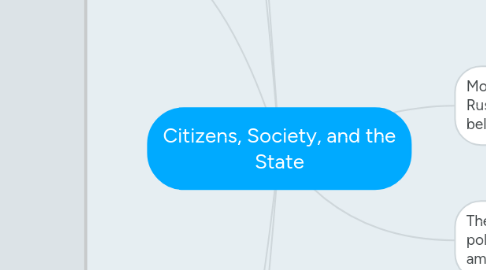
1. Cleavages
1.1. Nationality
1.1.1. The most important single cleavage in the Russian Federation.
1.1.2. 80% are Russians, the country includes large numbers of Tatars, Ukrainians, Armenians, Chuvashes, Bashkis, Byelorussians, and Moldavians.
1.1.3. Chechnya is a primarily Muslim region that fought for years for freedoms from Russia. However, despite the Chechens terrorist acts they signed a constitution declaring their region an "inseparable part" of Russia.
1.1.4. Trade benefits keep countries tied to the Russian Federation that would otherwise want independence.
1.1.5. Russian nationalists have taken responsibility for kidnappings, beheadings and a 2006 bombing that killed 10 at Moscow market operated mostly by immigrants.
1.1.6. December 2010 a publicized xenophobic case took place in a fatal shooting of an ethnic Russian soccer fan by a man from Russia's North Caucasus region. Thousands of young people began an extended riot close to Red Square, chanting "Russia for Russians" and racial slurs.
1.2. Religion
1.2.1. Tsarist Russia was almost entirely made up of the Russian Orthodox church
1.2.2. After the Soviet Union did away with religion as a whole, Yeltsin encouraged the church to reestablish itself
1.2.3. Other religions are represented in small percentages and include Roman Catholics, Jews, Muslims, and Protestants. Of these groups, the amount of Muslims is rapidly rising, with Russia now having more than any other European state except Turkey
1.2.4. Muslims in Russia tend to be concentrated in Moscow, the Caucasus, Bashkortostan, and Tatarstan.
1.3. Social Class
1.3.1. The old noble/peasant distinction was abolished
1.3.2. A new distinction came about during the Soviet Union years: members of the Communist Party and non-members. Only about 7% of the population were members, but this party included all of the political leaders
1.3.3. Today, Russian citizens appear to be more egalitarian than people of established democracies
1.3.4. A new socio-economic class is beginning to establish itself in Russia. This class is a class of wealthy entrepreneurs
1.4. Rural/Urban cleavages
1.4.1. 73% of Russians live in cities today and those people are more well-educated and in touch with western culture.
1.5. U.K. Comparison
1.5.1. Britain is a homogeneous culture and the major social cleavages that shape the way the political system worked were based on multi-national identities, social class distinctions, and the Protestant/Catholic split in Northern Ireland.
2. Beliefs and Attitudes
2.1. Mistrust of the government
2.1.1. Limited evidence shows that most Russians feel alienated from the political system.
2.1.2. Most citizens also have a strong distrust of the government and government officials (speciffically, they don't trust the institutions to convert their ideals to a reality.
2.2. Statism
2.2.1. Russian citizens (despite mistrust in the government) citizens expect the state to take an active role their daily lives.
2.3. Economic beliefs
2.3.1. Boris Yeltsin's market reforms divided pubic opinion regarding market reform.
2.3.2. Nearly all parties/electoral groups support the market transition (although supporters of the soviet regime are less enthusiastic)
2.4. Westernization
2.4.1. Slavophile: parties tend to strongly support Russia's integration into the world economy and trade (specifically European)
2.4.2. Westernizer: Parties tend to emphasize nationalism and the defense of Russian interests. The also often support a strong military and protection from foreign economic interference.
2.5. UK Comparison
2.5.1. The UK has a similar mistrust for their government, as well as similar nationalistic tendencies. However, Russia has stronger divisions over foreign and economic policy. The UK is much more favorable toward foreign influences.
3. Political Participation
3.1. Russian citizens did vote during Soviet Rule, but it was due to the fact that they would face serious consequences for staying home
3.2. The elections were not competitive and the candidates were hand-picked by the Communist leaders
3.3. After the economic crisis in 2008, protests were organized around Russia to criticize the government's economic policies
3.4. Since 1991, voter turnout has been higher in Russia than in the United States, ranging from 50-64% for Duma elections and 65-75% for the presidential elections
3.5. U.K. Comparison
3.5.1. The voting turnouts in Russia are less than the turnout rates in Britain, where over 70% of the population regularly votes
4. Civil Society
4.1. Despite high voter turnouts, participation in other political activities is low. Russia has an underdeveloped civil society, but it is growing only 1% report belonging to a political party.
4.2. Soviet authorities argued that only the party could and should represent the people's interests, and so state-sponsored organizations appeared in a state corporatist arrangement with the government clearly in control of channeling the voice of the people.
4.3. The government has placed severe restrictions on group activities, especially those who are openly critical of the government's polices.The government weakens these groups by police harassment, investigating sources of income, and making registration with the authorities difficult.
4.4. U.K. Comparison
4.4.1. British civil society is much better than that of Russia due to the well developed linkage institutions that Britain enjoys, along with a more open government policy with the people.
5. Russian Youth Groups
5.1. Putin created a handful of youth movements to support the government. The largest being Nashi.
5.2. Nashi receives grants from the government and large stat-run businesses, so critics of the group see it as an arm of an increasingly authoritarian state.
5.3. U.K. Comparison
5.3.1. Russian youth groups are much more prominent than those in Britain, and youth groups in the U.K. are not always created to support the government.

